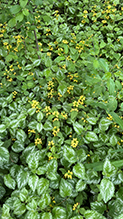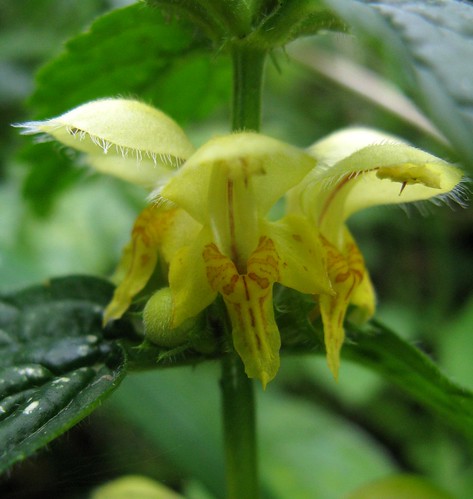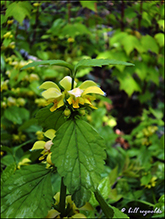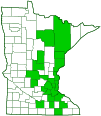variegated yellow archangel
(Lamium galeobdolon ssp. argentatum)
Conservation • Weed • Wetland • Description • Habitat • Ecology • Use • Distribution • Taxonomy
Description |
Yellow archangel (Lamium galeobdolon) is an exotic flowering plant in the Mint family. It is native to Europe and western Asia. It has been widely introduced as a garden plant in the United States and Canada, and it sometimes escapes cultivation. There are four subspecies of yellow archangel. Only one, variegated yellow archangel (Lamium galeobdolon ssp. argentatum), has been introduced into the United States. Variegated yellow archangel is a 6″ to 24″ tall perennial forb that rises from a creeping underground stem (rhizome). It spreads by producing creeping above-ground runners (stolons) that root and produce another plant at the nodes. The stolons have large leaves. The stems are square, and sparsely hairy. They may be erect, lay on the ground with the tip ascending (decumbent), or lay flat on the ground (prostrate). Stem leaves are opposite, ¾″ to 3½″ long, and 1.2 to 2 times longer than wide. They are on ⅜″ to 1¼″ long leaf stalks. The leaves become smaller and shorter stalked as they ascend the stem. Upper leaves are stalkless. The leaf blades are broadly egg-shaped, straight across to more or less heart-shaped at the base, and taper to a point at the tip with straight or concave sides along the tip. The upper and lower surfaces are sparsely covered with appressed hairs. The upper surface is marked with spots or patches of silver (variegated). The underside is often purplish. The margins are coarsely toothed with rounded or sharp teeth. The inflorescence is a pair of opposite branched clusters (cymes), at the end of the stem and rising from opposite leaf axils, that form a false whorl (verticillaster). There are usually 4 or 5 verticillasters per plant. Each verticillaster has 2 to 10 flowers. Each flower is ⅝″ to 1″ long. There are 5 sepals, 5 petals, 4 stamens, and 1 style. The sepals are green, ¼″ to ⅜″ long, and are fused at the base into a calyx tube then separated at the tip into 5 more or less equal lobes. The petals are bright yellow. They are fused at the base into a slender corolla tube then separated at the tip into 2 widely spreading lips. The corolla tube has a ring of hairs inside and is longer than the calyx tube. The upper lip is hood-like, unlobed, and has long, stiff, spreading hairs on the margin. The lower lip has 3 more or less equally sized lobes with brown markings. The stamens do not extend beyond the hooded upper lip. The style is about as long as the corolla and has 2 lobes at the tip. The fruit is four egg-shaped nutlets. |
Height |
6″ to 24″ |
Flower Color |
Yellow |
Similar Species |
Habitat |
Moist. Woodlands. Full to partial shade. |
Ecology |
Flowering |
April to June |
Pests and Diseases |
|
Use |
|
Distribution |
||
|
Sources |
|
| 5/21/2024 | ||
Nativity |
||
Native to Europe and western Asia. Cultivated and escaped cultivation. Naturalized in parts of North America. |
||
Occurrence |
||
Uncommon in Minnesota but increasing |
||
Taxonomy |
|
Kingdom |
|
Subkingdom |
Pteridobiotina |
Phylum |
Tracheophyta (Vascular Plants) |
Class |
|
Order |
Lamiales (Mints, Plantains, Olives, and Allies) |
Family |
Lamiaceae (Mint) |
Subfamily |
Scutellarioideae |
Tribe |
Lamieae |
Genus |
Lamium (deadnettles) |
Species |
Lamium galeobdolon (yellow archangel) |
Subordinate Taxa |
|
|
|
Synonyms |
|
Galeobdolon luteum Galeopsis galeobdolon Lamiastrum galeobdolon ssp. argentatum |
|
Common Names |
|
variegated yellow archangel yellow archangel |
|
Glossary
Axil
The upper angle where a branch, stem, leaf stalk, or vein diverges.
Calyx
The group of outer floral leaves (sepals) below the petals, occasionally forming a tube.
Corolla
A collective name for all of the petals of a flower.
Cyme
A branched, flat-topped or convex flower cluster in which the terminal flower opens first and the outermost flowers open last.
Node
The small swelling of the stem from which one or more leaves, branches, or buds originate.
Rhizome
A horizontal, usually underground stem. It serves as a reproductive structure, producing roots below and shoots above at the nodes.
Stolon
An above-ground, creeping stem that grows along the ground and produces roots and sometimes new plants at its nodes. A runner.
Verticillaster
A pair of cymes rising from opposite leaf clusters that creates a false whorl.
Visitor Photos |
||
Share your photo of this plant. |
||
This button not working for you? |
||
Doug Hansell |
||
 |
||
The area in red is where the plants are located. |
||
|
||
|
||
|
||
|
||
|
||
| See attached map of Wood Pond Park |
|
|
Bill Reynolds |
||
I understand from my research today that is an invasive plant in many areas throughout the US of A. The Yellow Archangel is from Europe and has escaped our garden into our wild environments of Minnesota. I don't recall the exact spot, since I took the photo back in 2006, but the area was just south of Canyon Mn off the MacArthur rd. I know its not a wild flower, but it might good to add for identification purposes, for it took most of my afternoon and help from people at Minnesota Wildflower to identified it. Though its an escapee, its quite the looker! |
||
MinnesotaSeasons.com Photos |
||
|
||
|

Slideshows |
Yellow Archangel |

|
About
Yellow Archangel (Lamium galeobdolon ssp. argentatum). |
BIO 101: Yellow Archangel |
About
Published on Dec 1, 2013 No description available. |
L.E.A.D. Service Learning (Yellow Archangel) |
About
Published on Dec 2, 2013 This is my culminating project for Biology 101. This video describes my experience working with L.E.A.D., facts about the Yellow Archangel, and describes how this invasive plant relates to topics we learned over the quarter including ecology, photosynthesis, and biodiversity. Information on the Yellow Archangel was found from Western's L.E.A.D. website. All other information was collected from Lab/In Class lectures. |

Visitor Videos |
||
Share your video of this plant. |
||
This button not working for you? |
||
|
Other Videos |
||
Yellow Archangel - Lamium galeobdolon |
About
Uploaded on Apr 20, 2011 http://www.InBloomThisWeek.com Perennial yellow archangel - Lamium species |

Visitor Sightings |
||
Report a sighting of this plant. |
||
This button not working for you? |
||
Doug Hansell |
Location: Wood Park, Burnsville |
 |
| Bill Reynolds 5/21/2006 |
Location: St. Louis County, just south of Canyon Mn off the MacArthur Rd. I understand from my research today that is an invasive plant in many areas throughout the US of A. The Yellow Archangel is from Europe and has escaped our garden into our wild environments of Minnesota. I don't recall the exact spot, since I took the photo back in 2006, but the area was just south of Canyon Mn off the MacArthur rd. I know its not a wild flower, but it might good to add for identification purposes, for it took most of my afternoon and help from people at Minnesota Wildflower to identified it. Though its an escapee, its quite the looker! |
 |
MinnesotaSeasons.com Sightings |
||

|
Created: Last Updated: © MinnesotaSeasons.com. All rights reserved. |


